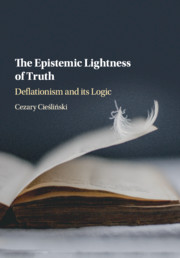Part III - Reflection Principles
Published online by Cambridge University Press: 30 November 2017
Summary
Parts I and II left us with two serious challenges, which undermine the deflationist's philosophical project: the generalisation problem and the conservativeness argument. A solution has been promised in a couple of places which, in spite of these objections, permits the deflationist to vindicate the idea of disquotational and conservative theories as satisfactory characterisations of the content of the truth predicate. This is the task I am going to undertake in Part III of this book.
When discussing disquotationalism, I emphasised that Horwich's second solution to the generalisation problem seems to involve an appeal to some form of reflection (see the final remarks of Section 5.2). It has also been observed that the reflection principles come to the foreground both in some formulations of the conservativeness argument and in some of the proposed defences against the charges of the critics, notably, in the defence offered by Tennant. In each of these cases, I have found the defences insufficient. In my opinion, appeals to reflection principles require a more thorough and deeper philosophical analysis.
Nevertheless, I view Horwich's and Tennant's attempts as steps in the right direction. Moreover, it seems to me that both challenges (the generalisation problem and the conservativeness argument) are similar enough to motivate the search for a unified, single answer – that is, for a proposal which would deal with both of them at the same time. In this context, the investigation of reflection principles is a promising direction of research. After all, both challenges point to the truth-theoretic or arithmetical weakness of the relevant disquotational/conservative theories. Reflection principles are not only intuitively correct, but they also increase the deductive power of theories, meaning that they can be viewed indeed as attractive remedies for the weaknesses of deflationary truth theories. Still, the following key question remains unanswered: exactly in what way can they be used by the deflationist without compromising his philosophical position? How can I accept, for example, a global or a local reflection principle for Peano arithmetic if my disquotational/conservative truth theory does not prove it?
- Type
- Chapter
- Information
- The Epistemic Lightness of TruthDeflationism and its Logic, pp. 203 - 206Publisher: Cambridge University PressPrint publication year: 2017



